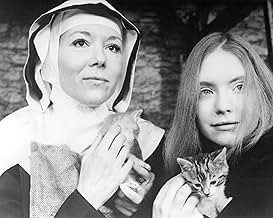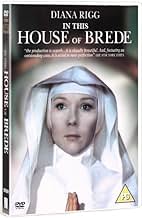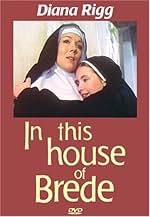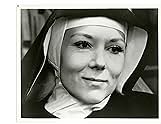Agrega una trama en tu idiomaA well-to-do London businesswoman gives up her comfortable life, including the man who loves her, to become a cloistered Benedictine nun.A well-to-do London businesswoman gives up her comfortable life, including the man who loves her, to become a cloistered Benedictine nun.A well-to-do London businesswoman gives up her comfortable life, including the man who loves her, to become a cloistered Benedictine nun.
- Dirección
- Guionistas
- Elenco
- Nominado a 1 premio Primetime Emmy
- 1 nominación en total
Fanny Rowe
- Miss Bowman
- (as Frances Rowe)
Dearbhla Molloy
- Dame Beatrice
- (as Dervla Molloy)
Yasuko Nagazumi
- Mariko
- (as Yasuko Magazumi)
- Dirección
- Guionistas
- Todo el elenco y el equipo
- Producción, taquilla y más en IMDbPro
Opiniones destacadas
Diana Rigg has always been one of my favourite actresses, going way back to 1960's "The Avengers" television series. I had originally seen this film when it was first released to American television in the 1970's, enjoyed it, and then as the years passed, and the film went out of distribution, forgot about it.
When "Brede" was reissued on VHS, I watched the movie again, and remembered how much I enjoyed it. Coincidentally, I managed to find a copy of Rumer Godden's novel, In This House of Brede and set down to read it. There are many plot differences between the novel and the film (I spent 200 pages reading waiting for the "movie" to start), but the central themes remain intact - the quest for individual spirituality, grief, loneliness, the questioning of one's personal decisions, jealousy, envy, discipline, and most importantly, love.
The character of Dame Phillipa (Diana Rigg) is one who feels deeply, but builds up very thick walls for her own protection. What impressed me most about Rigg's performance is that she manages to express her pain, grief, and inner turmoil while holding back the tears... just as I imagine Dame Phillipa would.
Dame Agnes (Pamela Brown) is extraordinary. (Having gone to a Catholic grade school run by Benedictine nuns, I can assure you that there are a few like Dame Agnes out there!) She reminds me very much of Gladys Cooper's character, Sister Maria Therese in The Song of Bernadette. She is of the "old school", resisting change, new ideas, people of worldly experience, and terribly jealous of Dame Phillipa. In the final reel, we do understand what makes Dame Agnes tick, and with that realisation, we can forgive her uncharitable behaviour.
My complaints about the film are few. It looks very much like a dated made-for-tv film from the 1970's today. The music score, which is a symphonic-pop amalgamation, does not hold up well and is at times intrusive. There was also much left out of the book when it was transformed into the screenplay that could have been filmed with an additional 30-40 minutes running time.
The beauties of this film far outweigh its shortcomings. After viewing it, I suggest you find a copy of the novel (if you can, it's currently out of print in the United States) and enjoy the author's original, and more extensive story.
When "Brede" was reissued on VHS, I watched the movie again, and remembered how much I enjoyed it. Coincidentally, I managed to find a copy of Rumer Godden's novel, In This House of Brede and set down to read it. There are many plot differences between the novel and the film (I spent 200 pages reading waiting for the "movie" to start), but the central themes remain intact - the quest for individual spirituality, grief, loneliness, the questioning of one's personal decisions, jealousy, envy, discipline, and most importantly, love.
The character of Dame Phillipa (Diana Rigg) is one who feels deeply, but builds up very thick walls for her own protection. What impressed me most about Rigg's performance is that she manages to express her pain, grief, and inner turmoil while holding back the tears... just as I imagine Dame Phillipa would.
Dame Agnes (Pamela Brown) is extraordinary. (Having gone to a Catholic grade school run by Benedictine nuns, I can assure you that there are a few like Dame Agnes out there!) She reminds me very much of Gladys Cooper's character, Sister Maria Therese in The Song of Bernadette. She is of the "old school", resisting change, new ideas, people of worldly experience, and terribly jealous of Dame Phillipa. In the final reel, we do understand what makes Dame Agnes tick, and with that realisation, we can forgive her uncharitable behaviour.
My complaints about the film are few. It looks very much like a dated made-for-tv film from the 1970's today. The music score, which is a symphonic-pop amalgamation, does not hold up well and is at times intrusive. There was also much left out of the book when it was transformed into the screenplay that could have been filmed with an additional 30-40 minutes running time.
The beauties of this film far outweigh its shortcomings. After viewing it, I suggest you find a copy of the novel (if you can, it's currently out of print in the United States) and enjoy the author's original, and more extensive story.
If I had never read the novel (and loved it), and if I had never lived the cloistered religious life (which I have), I would recommend this film without reserve.
My reservations are based on the following: Having lived in a cloister for over two years, I can tell you that, even in these post-Vatican II times, a postulant or novice would never be permitted to speak freely with another sister, especially an elder, without permission from her novice mistress. Recreations are not "free time", as depicted in the film; it is a daily get-together of the community as a whole, and it is encouraged that you converse in groups of at least three (you can talk to one other sister if you feel you have to, but certainly not for the whole recreation period). Also, silence being an essential and necessary aspect of contemplative monasticism, a sister, no matter what rank, would not sing out loud whenever and wherever she felt moved to do so, and especially not during work time. I could go on... but suffice it to say that this film is not an accurate depiction of cloistered life.
However, I do have positive feelings about this film. Even though it bears little resemblance in plot to the novel, it's still a good basic story in itself and is very well acted by an ensemble of wonderful actors. And, inaccurate of the life as it is, the film still evokes in me a nostalgic longing for the monastery, and I admit that I watch it for mainly that reason.
Oh, that the BBC would produce a mini-series of Godden's wonderful novel! That would be something to see. Godden was herself a Benedictine Oblate (lay persons connected by vows to a religious order), and her book is a loving and faithful tribute to Benedictine nuns everywhere.
My reservations are based on the following: Having lived in a cloister for over two years, I can tell you that, even in these post-Vatican II times, a postulant or novice would never be permitted to speak freely with another sister, especially an elder, without permission from her novice mistress. Recreations are not "free time", as depicted in the film; it is a daily get-together of the community as a whole, and it is encouraged that you converse in groups of at least three (you can talk to one other sister if you feel you have to, but certainly not for the whole recreation period). Also, silence being an essential and necessary aspect of contemplative monasticism, a sister, no matter what rank, would not sing out loud whenever and wherever she felt moved to do so, and especially not during work time. I could go on... but suffice it to say that this film is not an accurate depiction of cloistered life.
However, I do have positive feelings about this film. Even though it bears little resemblance in plot to the novel, it's still a good basic story in itself and is very well acted by an ensemble of wonderful actors. And, inaccurate of the life as it is, the film still evokes in me a nostalgic longing for the monastery, and I admit that I watch it for mainly that reason.
Oh, that the BBC would produce a mini-series of Godden's wonderful novel! That would be something to see. Godden was herself a Benedictine Oblate (lay persons connected by vows to a religious order), and her book is a loving and faithful tribute to Benedictine nuns everywhere.
How well I remember this film! I was fifteen years of age and I had read the book. I was attending St Mary's Abbey Grammar School in Mill Hill in Londond when our headmistress gave us the exciting news that a film was to be made in the school. Since it was an all girls school there was as much excitement in the electricians, floor crew, best boys and males in general as there was in the presence of Diana Rigg. To her credit she was very kind to a bunch of tongue-tied schoolgirls and made no objection to our sitting in and watching two of the scenes being shot. I'm not sure if my memory serves me correctly but as far as I recall it was our Sister Maureen who sang for Judy Bowker when she was taking her vows. I doubt we learned much during that time, there were way too many distractions. I saw the film once, many years ago but I really must make an effort to watch it again.
A professional organist friend of mine at a major cathedral in New York City is interesting in finding out what the organ music was in this movie. Apparently, it is played in fragments, which obviously makes determining what piece it is more difficult. Does anyone have a suggestion as to how to determine the identity of this music? The Music Director, unfortunately, has passed away. I would be grateful for any suggestions as to how to research this issue, before I write directly to BBC to attempt to follow-up. BBC have been very responsive in the past but I thought I would try this forum first. Sorry for the long-winded nature of this query - trying to get in my required ten lines of text.
This was one of those films that remains in your mind many years after it has been watched. I saw it quite some years ago and I still think back to it fondly. I think it is because Diana Rigg is such a consummate actress and lends integrity to the role. This was a super film and I would very much like to own a copy for myself.
Can anyone please help me locate a copy of this film? I have tried on Amazon but the price is extraordinary! Is £69 used a reasonable price to pay? I think that is dreadful. How can a film such as this command such a high price (as excellent as it was)? I would really like to find a copy for a reasonable price that I can add to my DVD collection. If anyone knows where or how to find a copy I would be very grateful to hear about it.
Many thanks
Can anyone please help me locate a copy of this film? I have tried on Amazon but the price is extraordinary! Is £69 used a reasonable price to pay? I think that is dreadful. How can a film such as this command such a high price (as excellent as it was)? I would really like to find a copy for a reasonable price that I can add to my DVD collection. If anyone knows where or how to find a copy I would be very grateful to hear about it.
Many thanks
¿Sabías que…?
- TriviaDiana Rigg, Dennis Quilley and Nicholas Clay also appeared together in "Evil Under the Sun"
- ConexionesFeatured in The 27th Annual Primetime Emmy Awards (1975)
Selecciones populares
Inicia sesión para calificar y agrega a la lista de videos para obtener recomendaciones personalizadas
Detalles
Contribuir a esta página
Sugiere una edición o agrega el contenido que falta






























